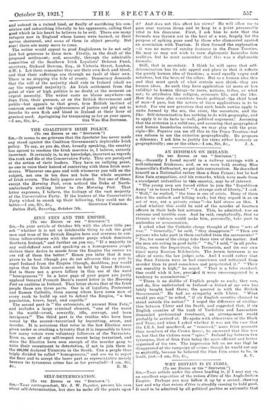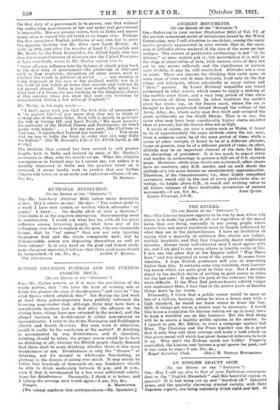WHY BRITAIN IS IN INDIA.
[To THE EDITOR OP THE " SPECIATOR."] Sia,—Your article under the above heading is, if I may say co, an excellent exposition of the raison d'être of the Anglo-Indian Empire. Perhaps you may follow it up by a second, showing how and why that raison d'etre is steadily ceasing to hold good. It used to be admitted by all political parties as axiomatic that the first duty of a government is to govern, and that without the unflinching maintenance of law and order real government is impossible. Butour present rulers, both. in. India and nearer home, seem to regard this old truth as no lenges. true. Perhaps the first prominent English politician of our own day to avow the opposite doctrine was Mr. John, (now Lored): Morley. As early as 1882, just after the murder of Lord F. Cavendish and Dlr. Burke by the- Irish Invincibles, Sir Alfred Lyalle who was then Lieutenant-Governor of what are now the United Provinces of Agra and Oudh, wrote to Mr. Morley urging him to
"throw alle-our influence into the balance of simply going back to the first duty of government—the protection of life—and stick to that resolutely, discarding all other issues, such as whether the revolt is political or social . . . our country is being disgraced in the eyes of the civilized world; nor is it the fault of our rulers at home that misrule and violence do not spread abroad. India is just now wonderfully quiet; but what sort of a lesson are you teaching to the dangerous classes Jf this country when you show that men can terrorize by assassination within, a few miles of England?"
Ur. Morley in his reply wrote :-
" I don't agree with you that the first didy of governments to protect lifo '—if you mean that they are to think of nothing else at the same time. Such talk is merely in principle the talk of George III, and Lord- North= Wo must preserve the authority of the British Crown and Parliament; we won't parley with rebels: . . . For my own part, like Chatham in that case, ' I rejoice-that Ireland- has resisted.' . . . You mean that we are to bully the Irish in order that you, may bully the Indian." [Sir M. Durand's Life of Sir Alfred Lyall, p. 258 et seg.] The doctrine thus avowed has been carried- to still greater lengths both in India and Ireland by some. of Mr. Morley's successors in office,. with the results we see. What the ultimate mnseq.uences, in Ireland, may be I cannot say, but unless it is speedily disavowed in India. and the practice' based- ea it reversed, it seems- herdly rash. to' predict that our Indian Empire will totter on to, an early and inglorione collapse.-11 am.,







































 Previous page
Previous page